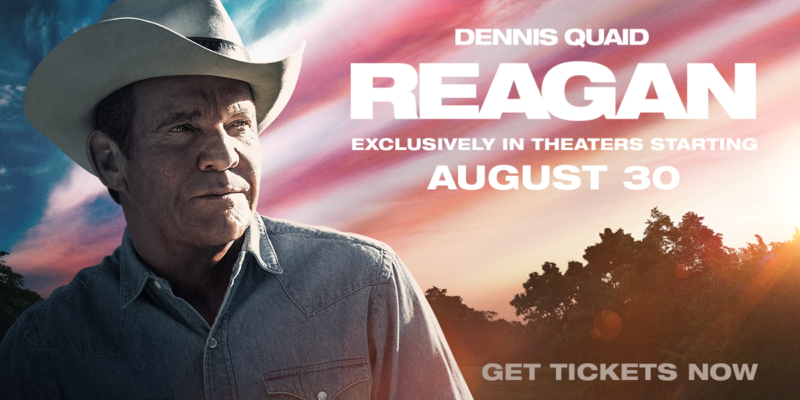Before there was George W. Bush’s “compassionate conservatism” there was Ronald Reagan’s “optimistic conservatism” rooted not so much in his confidence in himself (in contrast to his fellow White House occupants) but in God, the American people, and the unseen dynamics of freedom and capitalism that were as certain to Reagan as the existence of gravity.
This faith is referenced throughout the new box office movie on the Hollywood actor turned president, from surviving the assassination attempt to his time as a lifeguard understanding the river currents that threatened the lives of swimmers he would have to rescue.
Dennis Quaid nails the title character down in appearance, mannerisms, and voice…the latter being the key trait as the Gipper started off as a radio guy before moving to the silver screen.
At just over two hours, the film covers Reagan’s life, from childhood through his farewell letter to the nation as a visible public figure about his Alzheimer’s diagnosis.
Rather than being a straight biopic, the film is presented as an interview between a rising Russian nationalist politician determined to learn how the Soviet empire collapsed and a retired KGB analyst, played by Jon Voight, who followed and studied Reagan from his days as a bulwark against Communist infiltration of the Screen Actors Guild through his presidency.
Voight’s spy character traces Reagan’s strong convictions to his childhood, having modeled his early life from the Christian-themed book That Printer of Udell’s.
If you’ve read any of the number of books on Reagan, many of the scenes from the film will seem familiar and with the exception of the interspersed back and forth between Voight’s character and an aspiring Putin wannabe.
The film is a tapestry of those moments.
Yet not all is sunny in the Californian’s story as the film also shows Reagan at his low points, with the collapse of his marriage to actress Jane Wyman (played by Mena Suvari from American Beauty) to the degrading roles he played in Nevada casino shows just to make ends meet.
Later on in the film another turbulent moment is touched on that has added relevance today. After a poor showing against Walter Mondale in the initial 1984 debate, rather than.folding it up and vacating the race, Reagan rallied in the subsequent debate bringing the house and Mondale down with a witty retort about his advanced age.
Advertisement
Unlike most political movies, Reagan goes heavy on the bond between husband and wife. They’re president and first lady second, but soulmates first. Though there are no shortage of scenes showing the pair interacting, two standout in particular: the immediate aftermath of Reagan being critically wounded outside the Washington Hilton and the moment the president’s security detail breaks the news to Nancy that for her husband’s own safety that Rawhide (Reagan’s Secret Service code name) must give up the activity he loved most, horseback riding.
Reagan had a Lincoln-esque view of politics and the world based upon right and wrong, with the political consequences not factoring in his policies and statements. And like Lincoln, Reagan was not averse to bringing on board one-time rivals, including Jim Baker, who had successfully thwarted the Californian’s bid to wrest the Republican presidential nomination from incumbent President Gerald Ford at the 1976 GOP convention in Kansas City.
If there is one omission from the movie that I believe to have been an essential part of Reagan’s political rise was Ford’s invitation to Reagan to address the convention after the nomination was decided. As much any speech Reagan delivered, his unprepared remarks led to his winning the GOP nod in 1980 and also led to many Ford delegates to surmise they had just nominated the wrong candidate.
Secretary of State George Shultz, the largely forgotten man in the Reagan story living in Henry Kissinger’s shadow, finally receives his due and is the cabinet member who is the film’s focus more than any other secretary. Also captured are flashpoints between the more pragmatic Shultz and the idealism of Reagan over the direction of foreign policy.
Reagan and Shultz, along with their allies in the United Kingdom, Germany, Japan, Canada, and the Vatican, would transform the world through the exertion of pressure on the Soviet Union and their captive satellite countries in the Eastern Bloc- leading to the collapse of the Berlin Wall- as much a symbol of totalitarianism as the hammer and sickle- and the dissolution of the USSR without the superpowers having fired a shot directly at each other.
As the generation who voted for Reagan passes on and the 40th president not being held in high regard by either the media or academia, the film is a well-presented encapsulation of his character, philosophy, and record that will contribute to the preservation of his legacy.
Reagan opens up in theaters this Friday, August 30th.
Advertisement
Advertisement

